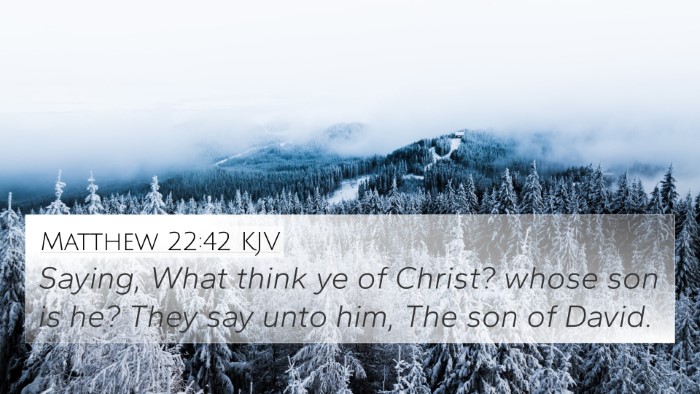Understanding Matthew 18:12
Matthew 18:12 states: "What do you think? If a man has a hundred sheep, and one of them has gone astray, does he not leave the ninety-nine on the mountains and go in search of the one that went astray?" This verse is emblematic of the compassionate nature of Christ’s love for humanity, conveying profound insights on the value of individuals in the eyes of God.
Summary of Insights
This verse invites a deeper reflection on themes of love, loss, and redemption. The shepherd represents Jesus, who prioritizes the lost and straying believers. Through a careful examination of this passage from various public domain commentaries, we can derive meaningful interpretations that enhance our understanding of its significance.
-
Matthew Henry's Commentary:
Henry elaborates on the pastoral care depicted in this parable, highlighting the shepherd’s willingness to abandon the flock temporarily to seek the one lost sheep. It underscores God's relentless pursuit of sinners, emphasizing that no one is beyond His reach and care.
-
Albert Barnes' Notes:
Barnes emphasizes the folly of the lost sheep but balances this with the immense grace shown by the shepherd. He notes that this act of seeking reflects God's infinite love and desire for each individual’s salvation, portraying a personal relationship between God and believers.
-
Adam Clarke's Commentary:
Clarke provides insight into the cultural context of shepherding during biblical times, noting that leaving ninety-nine sheep to pursue one might seem imprudent, yet it illustrates the depth of care a true shepherd has for the flock, symbolic of Christ’s commitment to His followers.
Key Themes and Their Significance
This verse can be linked to several important themes in Scripture:
- Divine Care: It emphasizes God's watchfulness over His people.
- The Value of Every Soul: Every individual is precious, and God desires that none should perish.
- Redemption: It reflects the theme of seeking and saving the lost, pivotal to the gospel message.
Bible Verse Cross-References
The richness of Matthew 18:12 can be further appreciated through cross-references with other Biblical texts. Here are some notable connections:
- Luke 15:4-7: The parable of the lost sheep expands on the same theme with similar imagery, highlighting God's joy over one sinner who repents.
- John 10:11: Jesus declares Himself as the Good Shepherd, providing a direct link to His sacrificial nature.
- Isaiah 53:6: References the wayward nature of humanity and the great love of God in bringing them back.
- 1 Peter 2:25: Speaks of believers returning to the Shepherd, reinforcing the continuous theme of redemption.
- Luke 19:10: Jesus says He came to seek and save the lost, resonating with the message of Matthew 18:12.
- Matthew 9:36: Here, Jesus sees the crowds and has compassion on them, akin to the shepherd's care.
- Romans 5:8: Highlights God's love towards us in that while we were still sinners, Christ died for us.
Comparative Bible Verse Analysis
In examining the connections between Bible verses, we observe how the message of Matthew 18:12 is echoed throughout Scripture, emphasizing the thematic continuity of God's pursuit of humanity. The cross-referencing of Biblical texts demonstrates how interconnected the scriptures are, providing a cohesive understanding of God’s intentions and the nature of His love.
Tools for Bible Cross-Referencing
Utilizing tools such as a Bible concordance, Bible cross-reference guide, and cross-reference Bible study methods can amplify your study of Scriptures. These resources assist in identifying relationships between verses, facilitating a comprehensive understanding of the themes woven throughout the Bible.
Conclusion
In concluding our reflection on Matthew 18:12, we see the paramount importance of understanding what it means to seek the lost and demonstrate the value of each individual to God. This passage serves as a reminder of God’s unwavering love and the relational aspect of faith, encouraging believers to reflect this same care in their own lives.

















